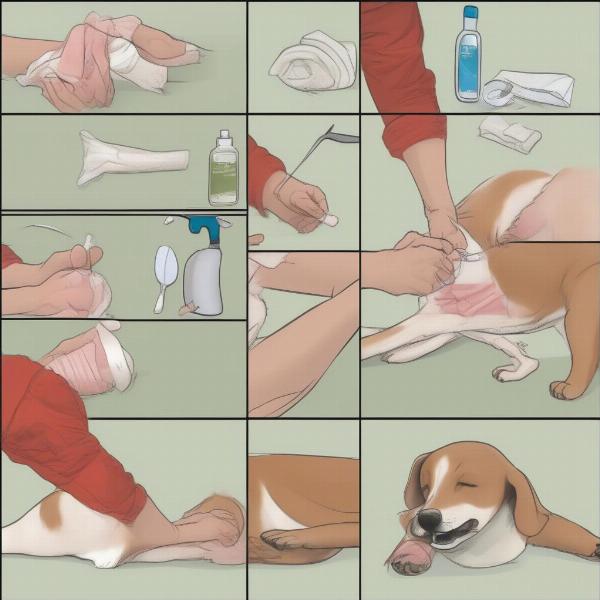Wisconsin dog bite laws are complex and can be confusing for both dog owners and victims. Understanding these laws is crucial for responsible pet ownership and for knowing your rights if you are involved in a dog bite incident. This article will provide a comprehensive overview of Wisconsin’s dog attack laws, covering liability, owner responsibilities, and steps you can take to prevent dog bites.
Dog bites can result in serious injuries, emotional trauma, and financial burdens. In Wisconsin, the legal framework surrounding dog bites aims to hold owners accountable while also recognizing the complexities of animal behavior. Whether you’re a dog owner or someone who interacts with dogs regularly, familiarizing yourself with these laws is essential.
Understanding Wisconsin’s “Strict Liability” Law
Wisconsin follows a “strict liability” rule when it comes to dog bites. This means that the owner is liable for injuries caused by their dog, regardless of whether they knew the dog was dangerous or had a history of aggression. There are a few exceptions to this rule, which we’ll discuss later, but the general principle is that the owner is responsible for their dog’s actions. This strict liability applies to injuries caused by biting, scratching, or other physical contact that results in harm.
Exceptions to Strict Liability
While Wisconsin’s dog bite law is generally strict liability, there are some exceptions. An owner may not be held liable if the injured person was provoking the dog, trespassing on the owner’s property, or committing a crime at the time of the attack. Furthermore, if the dog was protecting its owner or another person from an attack, the owner might not be held responsible for injuries inflicted by the dog.
Owner Responsibilities and Preventing Dog Bites
Responsible dog ownership plays a vital role in preventing dog bites. Owners should ensure their dogs are properly socialized, trained, and contained. This includes using leashes in public, securing fences, and avoiding situations that might trigger aggressive behavior. Obedience training is highly recommended and can significantly reduce the risk of a dog bite incident. Furthermore, spaying or neutering your dog can also help to lessen aggression.
What to Do if You Are Bitten by a Dog in Wisconsin
If you are bitten by a dog in Wisconsin, seek medical attention immediately, even if the bite seems minor. Document the incident thoroughly, including the date, time, location, dog owner’s information, and any witnesses. Report the bite to your local animal control agency and consult with a personal injury attorney to understand your legal options.
Dog Bite Lawsuits and Damages
Victims of dog bites can pursue legal action to recover damages for medical expenses, lost wages, pain and suffering, and emotional distress. The severity of the injuries and the circumstances of the attack will influence the potential amount of compensation. It’s important to gather as much evidence as possible, including medical records, photographs of injuries, and witness testimonies.
 Dog Bite First Aid
Dog Bite First Aid
Resources for Dog Owners in Wisconsin
Numerous resources are available to help dog owners in Wisconsin understand their responsibilities and prevent dog bites. Local animal shelters and humane societies often offer obedience training classes and educational materials on responsible pet ownership. Additionally, online resources like the Wisconsin Humane Society website can provide valuable information.
Navigating the Legal Landscape After a Dog Bite
Dealing with the aftermath of a dog bite can be challenging. It’s crucial to understand your rights and responsibilities under Wisconsin law. Consulting with a legal professional experienced in dog bite cases can help you navigate the legal process and pursue appropriate action.
Conclusion
Wisconsin’s dog attack laws are designed to protect both people and animals. Understanding these laws, practicing responsible dog ownership, and taking appropriate precautions can help prevent dog bites and ensure a safe environment for everyone. By being informed and proactive, we can minimize the risks associated with dog bites and promote harmonious interactions between humans and their canine companions.
FAQ
- What is strict liability in dog bite cases? Strict liability means the dog owner is responsible for injuries caused by their dog, regardless of whether they knew the dog was dangerous.
- Are there any exceptions to Wisconsin’s strict liability law? Yes, exceptions exist if the victim provoked the dog, trespassed, or was committing a crime.
- What should I do if I’m bitten by a dog? Seek medical attention, document the incident, report it to animal control, and consult with an attorney.
- What damages can I recover in a dog bite lawsuit? You may recover medical expenses, lost wages, pain and suffering, and emotional distress.
- Where can I find resources on responsible dog ownership in Wisconsin? Local animal shelters, humane societies, and online resources like the Wisconsin Humane Society website offer helpful information.
- Is it mandatory to report a dog bite in Wisconsin? Yes, it’s recommended to report the bite to your local animal control agency.
- Can I sue even if the dog has no prior history of aggression? Yes, Wisconsin’s strict liability law applies even if the dog has no previous history of biting.
About ILM Dog:
ILM Dog is your trusted source for expert advice on all aspects of dog care, from breed selection and puppy care to senior dog care and training. We offer valuable resources on dog health, nutrition, behavior, and product reviews to help you provide the best possible care for your furry companion. For expert advice and support, contact us at [email protected] or call +44 20-3965-8624. Visit ILM Dog for more information on dog breeds, health, and training.